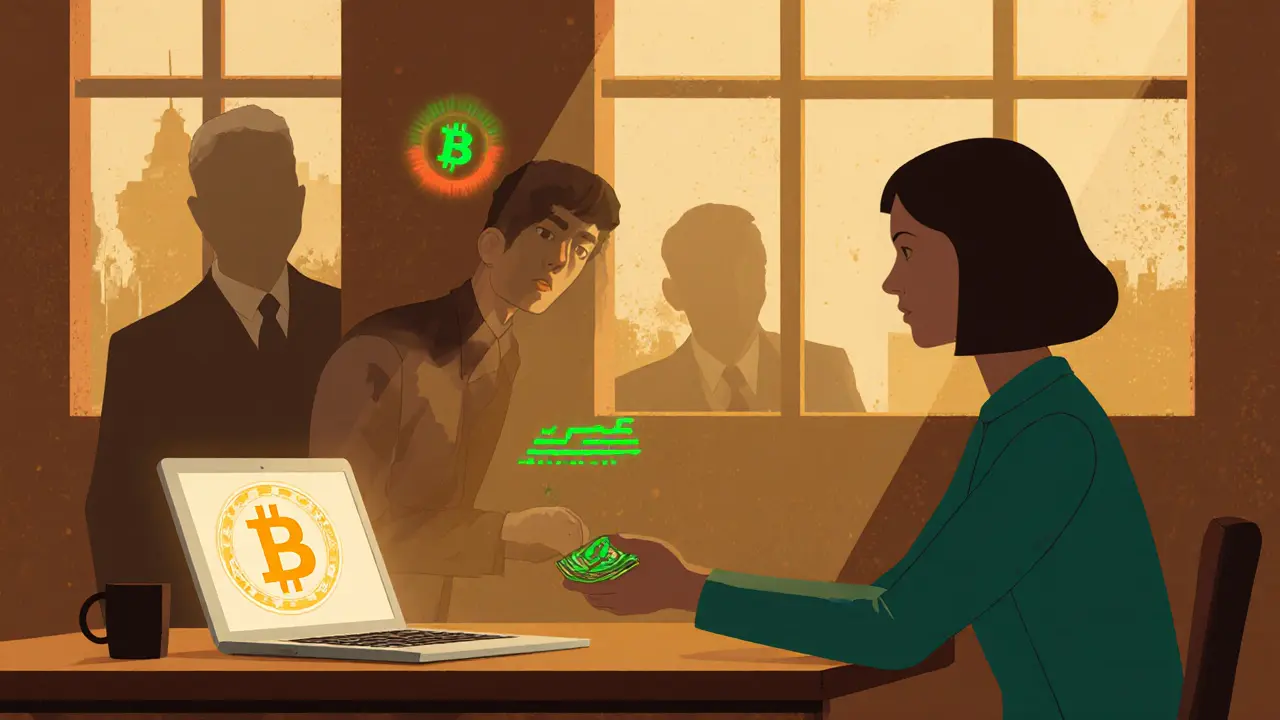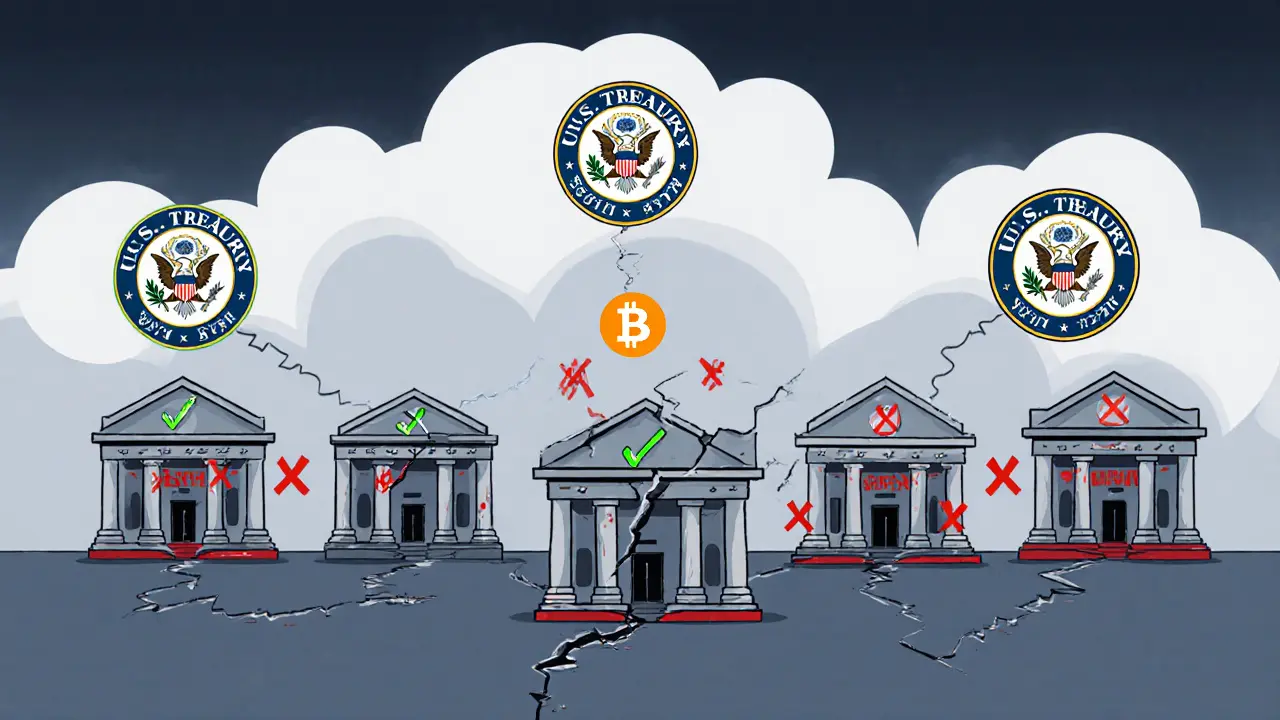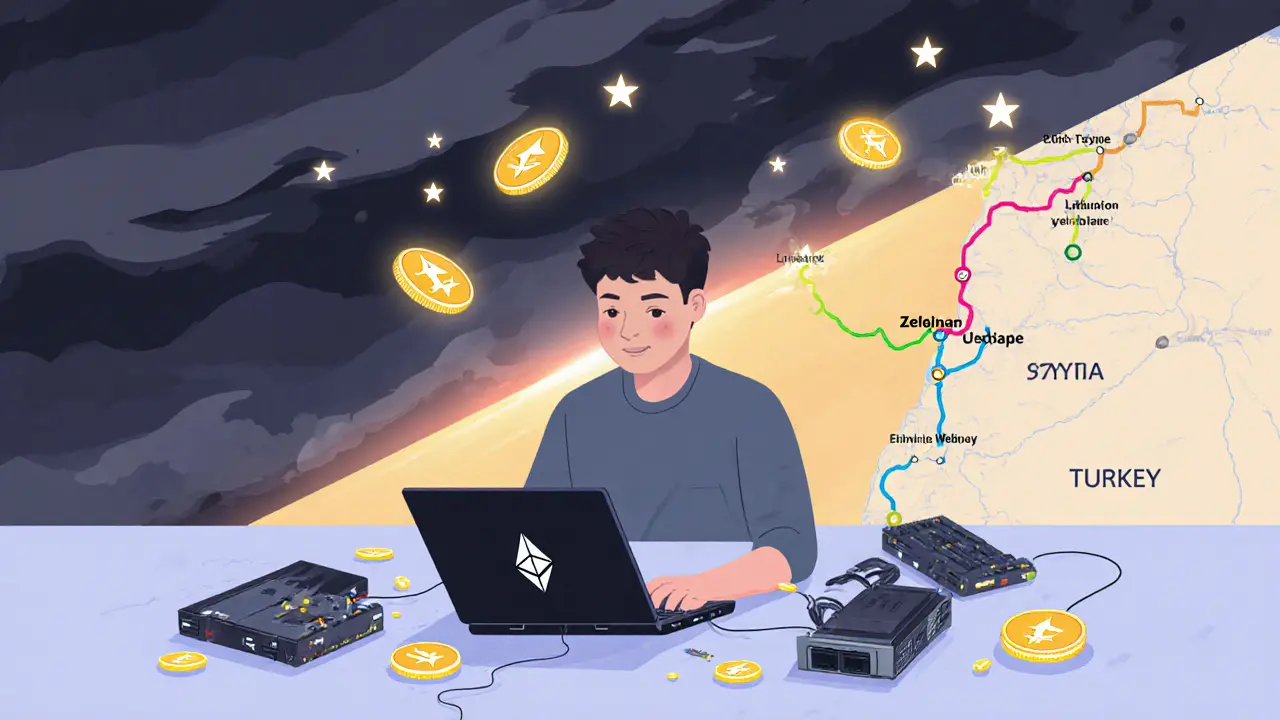
Syria Crypto Sanctions Risk Checker
Check if your transaction might be flagged by international compliance systems due to residual sanctions.
Based on 139 sanctioned individuals and entities still active in Syria's financial system.
What This Means
Residual sanctions affect 139 individuals and entities linked to Syria's former regime. Transactions involving these entities trigger compliance flags.
- High Risk Wallet previously interacted with sanctioned entities
- Medium Risk Wallet recently connected to known Syrian entities
- Low Risk Wallet has no known connections to sanctioned entities
Risk Assessment
Enter a wallet address to check sanctions risk
It’s November 2025, and Syria’s crypto scene looks like it should be booming. Sanctions lifted. Banks reopening. International exchanges like Binance allowing Syrian users to sign up. So why are people still struggling to send or receive crypto? Why do accounts get frozen mid-transaction? Why do 78% of payments from Syrian wallets get flagged by foreign banks? The answer isn’t a ban-it’s something messier: residual sanctions.
Sanctions Didn’t Disappear. They Got Cut in Half.
On July 1, 2025, the U.S. officially ended its comprehensive economic sanctions on Syria. The Assad regime was gone. A new interim government took over. The Treasury Department pulled the Syrian Sanctions Regulations off the books. At first glance, it looked like a green light for crypto. But here’s what didn’t make the headlines: 139 individuals and companies linked to the old regime are still on the sanctions list. These aren’t random names. They’re former ministers, military commanders, and business owners who controlled Syria’s financial infrastructure for 20 years. If you’re trading crypto and your wallet ever interacted with one of them-even years ago-you’re now a compliance risk.That’s why Binance, Kraken, and Coinbase don’t just say “no” to Syrian users. They say “we need 14 documents, a notarized affidavit, and a live video call with someone who can prove you’ve never met any of these 139 people.” And even then, your account might still get locked. Why? Because U.S. banks still have to answer to OFAC. And OFAC doesn’t care if you’re a student in Aleppo or a shopkeeper in Homs. If your transaction touches a designated name-even indirectly-it’s a violation waiting to happen.
The Banking Gap: No On-Ramps, Just Dead Ends
You can buy Bitcoin on Binance from Syria. But turning it into Syrian pounds or sending it to a local supplier? That’s where it falls apart. Only three of Syria’s twelve major banks have managed to open correspondent accounts with U.S. institutions. That means only three banks can process dollar transactions. And even those three are terrified of crypto.Why? Because the U.S. Treasury says “you can now do business with Syrian banks,” but then adds: “but only if you monitor every single transaction against 13 separate sanctions lists.” That’s not just hard. It’s nearly impossible without AI-powered screening tools that cost $200,000 a year-far beyond what any Syrian bank can afford. So instead of enabling crypto-fiat conversions, they just freeze anything that looks suspicious. A $500 transfer from a crypto wallet? Flagged. A $300 payment to a Damascus supplier? Flagged. A $100 remittance to a cousin in Turkey? Flagged.
Users report transaction delays averaging 47 hours. That’s two full days waiting for a simple transfer. And 63% of negative reviews on Binance from Syrian users cite “account freezes during onboarding.” No explanation. No appeal process. Just silence.
No Law, No Rules, No Clarity
Syria doesn’t have a crypto law. Not one. No ban. No license. No tax rule. No KYC requirement. Nothing. That sounds like freedom. But in practice, it’s chaos.Imagine trying to open a crypto exchange in Syria. You can’t. Because you need a business license. But the government doesn’t have a category for “blockchain company.” You can’t hire a lawyer to advise you. Because no lawyer in Syria has ever dealt with crypto compliance. You can’t even get a bank account to hold your business funds. Because the banks won’t touch anything that might trigger a U.S. sanction violation.
This isn’t like Iran or Venezuela, where the government created a state-backed crypto system. Syria has no Petro. No digital rial. No central bank coin. It has nothing. And because of that, international platforms treat Syria like a black hole-too risky to serve, too big to ignore.

What’s Still Blocked? Mining, Tech, and Tools
Even if you bypass the banking mess, you still can’t legally buy the tools you need. The U.S. Bureau of Industry and Security lifted most export controls-but not all. Anything on the Commerce Control List still needs special permission. That includes:- ASIC mining rigs
- High-performance GPUs
- Blockchain server hardware
- Encryption software
- Node hosting infrastructure
So if you’re trying to set up a crypto mining operation in Homs, you can’t legally import the equipment. You can’t even order a decent graphics card from Amazon without it being blocked at customs. Some Syrians are smuggling hardware across the Turkish border. Others are using old laptops from 2015 to mine Ethereum Classic. It’s slow. It’s inefficient. And it’s not scalable.
What Are People Actually Doing?
Despite all this, an estimated 1.2 million Syrians-about 6% of the population-are using crypto. How? They’re not waiting for banks or exchanges to fix things. They’re building their own workarounds.Peer-to-peer (P2P) trading is exploding. On local Telegram groups and Facebook pages, people trade Bitcoin for cash in coffee shops. A man in Idlib sells 0.05 BTC for 2 million Syrian pounds. A woman in Raqqa buys $300 in USDT to pay her daughter’s tuition in Jordan. These deals happen face-to-face, in person, with no digital trail. They’re risky. 22% of users in a recent informal survey reported losing money to scams. But it’s the only way left.
Some are using Lebanon or Jordan as intermediaries. They send crypto to a friend in Beirut, who withdraws cash and gives them Syrian pounds in return. It’s not legal. It’s not regulated. But it works. And it’s growing.

The Real Barrier Isn’t Tech. It’s Trust.
The biggest problem isn’t the sanctions. It’s the fear. International banks don’t trust Syria. Not because of the government. Because of the uncertainty. Will the U.S. reverse course again? Will new sanctions pop up next year? Will the new government collapse? No one knows.That’s why even when the rules technically allow it, no one moves fast. Exchanges delay onboarding. Banks reject transfers. Payment processors shut down accounts without warning. The system is designed to say “no” by default. And in a country where people are trying to rebuild their lives after 14 years of war, that default is crushing.
Chainalysis estimates Syria’s crypto market could hit $420 million a year by 2027-if clarity comes. But right now, the only thing moving faster than crypto adoption is the erosion of trust. Every frozen account. Every blocked transaction. Every unanswered support ticket chips away at the belief that this system can work for ordinary Syrians.
What Needs to Happen Next?
There’s no magic fix. But three things would make a huge difference:- Syria needs a crypto law. Not a ban. Not a state coin. Just a clear set of rules: who can operate, what KYC is required, how taxes work. Without this, no foreign company will invest.
- OFAC needs to publish a Syria-specific crypto compliance guide. A list of what’s allowed, what’s not, and how to screen properly. Right now, companies are guessing. That’s not compliance. That’s liability.
- International banks need incentives to take the risk. Maybe a U.S. government-backed insurance fund for crypto-related transactions with Syria. Or a sandbox program that lets compliant exchanges operate under supervision.
Until then, Syrians will keep trading in coffee shops, smuggling hardware, and hoping the next transaction doesn’t get frozen. The sanctions are gone. But the fear? That’s still here.
Jenny Charland
24 11 25 / 04:46 AMThis is literally the most obvious thing in the world and no one wants to say it: the US doesn't want Syria to succeed. They're scared if crypto works here, it'll expose how broken the whole sanctions regime is. 🤡
Dave Sorrell
25 11 25 / 02:30 AMThe core issue isn't the sanctions list-it's the lack of clear guidance from OFAC. Financial institutions are paralyzed because they don't know what 'compliance' looks like anymore. A simple FAQ from the Treasury could unlock billions in humanitarian crypto flows.
David Hardy
25 11 25 / 10:13 AMPeople in Syria are just trying to feed their families and pay for medicine. The fact that they're building P2P networks in coffee shops is wild. 👏
Amanda Cheyne
26 11 25 / 22:47 PMYou think this is about sanctions? Nah. This is a psyop. The same people who pushed the war are now controlling the digital economy from behind the scenes. They don't want Syria to be independent. They want it dependent on their systems. The 139 names? Fabricated. The 'compliance' requirements? A trap. They're using blockchain to keep people poor. I've seen the documents. It's all connected. 🕵️♀️
preet kaur
28 11 25 / 06:03 AMI come from India, where we’ve had our own financial isolation for decades. I’ve seen how communities build trust networks when institutions fail. What Syrians are doing-cash-for-Bitcoin in cafes-isn’t illegal, it’s human. We need to support that, not judge it.
Anne Jackson
28 11 25 / 14:27 PMI’m sorry but why should American banks risk their licenses for a country that still has ex-regime loyalists running around? This isn’t about hatred-it’s about protecting the system. If you can’t prove you’re not tied to war criminals, then no, your crypto shouldn’t go through. It’s common sense.
John Borwick
29 11 25 / 14:42 PMThe real tragedy is that Syrians are innovating in the most brutal conditions possible and still getting treated like criminals. We have the tech to fix this. We just don't have the will. Let people trade. Let them mine. Let them rebuild. The fear is making us worse than the problem
Linda English
1 12 25 / 07:14 AMI really appreciate how thoughtful this post is, and I think it’s so important to recognize that the absence of formal regulation doesn’t mean chaos-it means adaptation. People are finding ways to survive, to connect, to care for one another, even when every institutional door is slammed shut. And while the technical barriers are immense, the emotional toll-of being treated as a risk instead of a person-is what keeps me up at night. We have to remember that behind every frozen transaction is someone’s child’s tuition, someone’s medicine, someone’s hope.
Lisa Hubbard
1 12 25 / 10:58 AMI mean, I get it, but honestly, how much time are we supposed to spend on this? It’s not like the U.S. is going to change anything. And Syrians just need to figure it out themselves. Maybe they should stop complaining and learn to code or something. I don’t know, just saying.
Belle Bormann
2 12 25 / 22:59 PMso like the 139 names thing is wild right? i just read that and thought wow. also i think syria needs a crypto law like yesterday. also i think the banks are being wierd. idk. just saying. maybe they should just let people use crypto. i mean its not like its illegal right?
Emily Michaelson
3 12 25 / 06:31 AMThe most overlooked point here is that international banks aren't just being cautious-they're being economically rational. Without a clear legal framework or government-backed insurance, the liability outweighs the upside. The solution isn't just better tech-it's policy innovation. A sandbox program with liability caps could be the bridge we need.